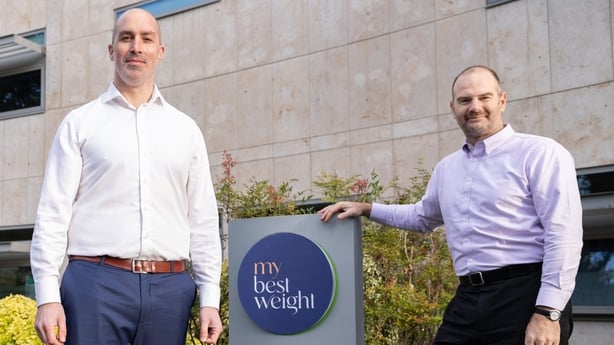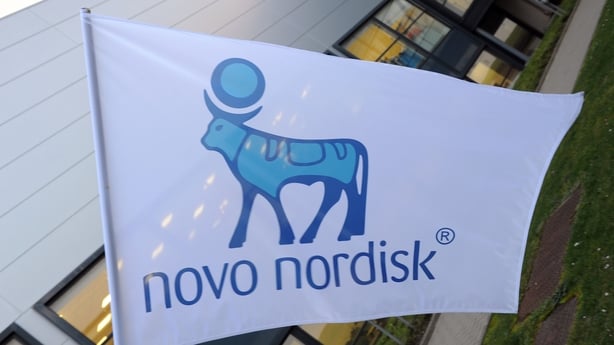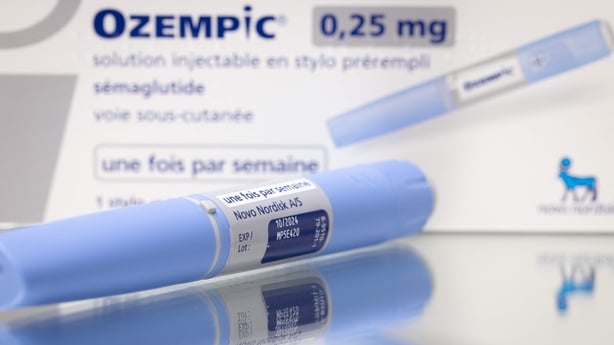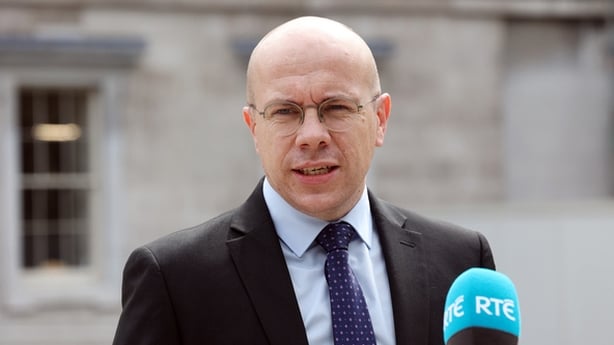[ad_1]
Drug maker Novo Nordisk has landed in hot water in the UK over its promotional practices. RTÉ Investigates examines the company’s links to medical experts in Ireland.
Business is booming for drug manufacturer Novo Nordisk, whose weight loss drug Ozempic has been flying off the shelves in the US.
Last year, the EU approved a related drug, Wegovy, amid considerable media attention.
Doctors expect massive demand for this drug, lauded as a “game changer” in treating obesity when it becomes available on the Irish market.
While Novo Nordisk must be pleased with its success, it has also been the subject of recent controversy in the UK.

Earlier this year, the UK’s Association of British Pharmaceutical Industry (ABPI) suspended Novo Nordisk for two years.
The association noted that the company had sponsored a free weight management course for healthcare professionals, which it found was a “disguised” large-scale promotional campaign that breached the association’s code of practice.
And in March, an Observer newspaper investigation reported that between 2019-2021, Novo Nordisk paid almost £22m to healthcare organisations and professionals “to boost its UK influence”.
Meanwhile, RTÉ Investigates can reveal that in Ireland from 2016 to 2021, Novo Nordisk spent around €2.1m in consultancy payments, travel costs and related expenses to healthcare professionals, as well as sponsorships, donations and grants to healthcare organisations, according to data published by an industry trade association.
RTÉ’s investigation raises questions about whether medical experts with commercial ties to a drug company should disclose those ties when discussing the company’s products in the media.
Among the recipients of Novo Nordisk payments in Ireland are two obesity experts, Prof Carel le Roux and Dr Michael Crotty, who have received thousands of euro in consultancy fees from the company.
They have each been interviewed extensively in the Irish media about obesity.
In March 2022, they issued a press release which praised Wegovy but did not refer to their links to Novo Nordisk.
This press release was the basis for several reports in the broadcast and print media, in which their ties to the drug manufacturer were not revealed.
Both doctors have also made public calls for certain Novo Nordisk drugs to be made available on the State-funded drug schemes, while not disclosing their ties to the company at the time.
Disclosure
In Ireland, the trade body for pharmaceutical companies, the Irish Pharmaceutical Healthcare Association (IPHA), publishes certain details of pharmaceutical payments to doctors on a website.
This includes payments such as consultancy fees, expenses for attending medical conferences and meetings, and donations and sponsorships paid to healthcare organisations.
However, doctors can insist that they are not identified on the website.
It shows that in Ireland, between 2018-2021, Novo Nordisk paid Prof le Roux, a consultant at St Vincent’s University Hospital, more than €40,000 in consultancy fees.
Prof le Roux is a member of a Novo Nordisk international advisory board, which he joined in 2014.

In the UK, the ABPI also maintains a website detailing pharmaceutical payments to healthcare professionals there.
This shows that in 2019 and 2020, Novo Nordisk paid Prof le Roux around £55,000 in consultancy fees and spent approximately £13,000 on his expenses.
Separately, the Irish data shows that Dr Crotty, a GP with a weight loss clinic in Dublin called My Best Weight, which he co-founded with Prof le Roux, received consultancy fees of €10,000 from the company in 2020 and 2021.
He told RTÉ Investigates that he also received €15,500 in consultancy fees last year and acted as a Novo Nordisk advisory board member from November 2020 to November 2022.
Media attention
In March 2022, the EU’s European Medicines Agency approved Wegovy for patient use, prompting a flurry of media attention.
My Best Weight issued a press release on the subject, which described Wegovy as a “breakthrough” obesity drug and quoted both Prof le Roux and Dr Crotty.
“The approval of Wegovy provides great promise for people with obesity,” Prof le Roux said, adding: “The unprecedented level of weight loss this medication achieves marks a new era in the treatment of this disease.”
The press release also quoted Dr Crotty saying that people taking the medication “notice a reduction in appetite and feel more satisfied.”
Yet the press release did not reference the doctors’ ties with the Wegovy maker, Novo Nordisk.
Several media outlets, including RTÉ, Newstalk and the Irish Independent, broadcast or published stories based on the press release.
In an interview with RTÉ’s Today with Claire Byrne, for example, Prof le Roux said that “this [Wegovy] is not a weight loss drug, it’s a health gain drug”, while Dr Crotty told RTÉ News that Wegovy will help people living with obesity “manage their weight long-term in a safe, effective way.”
When asked if the press release should have disclosed his ties to Novo Nordisk, Dr Crotty said: “Any relationship I have had with Novo Nordisk is in the public domain, as per my conflicts of interest.
“The purpose of the press statement was to inform the public of a major development and advancement in the field of obesity medicine with the European Medicines Agency approving a new treatment.”
In response to the same question, Prof le Roux said his conflicts of interest are in the public domain.
“All questions asked by the journalists or their researchers regarding conflict of interests were answered,” he said.
“I will also include conflicts of interest in future press releases,” he added.
Both doctors also stated that they had disclosed their conflicts of interest in published medical studies.
Medical Council
RTÉ Investigates asked the Medical Council if it requires doctors who have benefitted financially from a pharmaceutical company to declare this interest when participating in media interviews involving the company’s products.
It referred us to guidelines which state that doctors “should tell patients and any other relevant party about any professional relationship [they] have with these companies.”
Both Prof le Roux and Dr Crotty publicly called for Novo Nordisk drugs to be added to the reimbursable list of prescription drugs, which would enable patients to have the costs of the drugs covered under the public drug schemes.
In a Newstalk interview in March 2022, for example, in a discussion about the cost of Wegovy, Dr Crotty said: “The HSE and the Department of Health need to fund and reimburse these medications so they can be available.”

Elsewhere, in an interview on Highland Radio that month, also concerning Wegovy, he said: “There are other medications licensed for weight, but physically, this one [Wegovy] will be available probably in four to six months’ time. And we really need to fight to have this reimbursed.”
Dr Crotty told RTÉ Investigates that he had not undertaken paid work on behalf of Novo Nordisk relating to Wegovy or Ozempic and said that the company had reimbursed him for delivering educational sessions for healthcare professionals.
He also said that his advisory board work involved giving expert opinion on supporting people living with obesity.
He added that his conflicts of interests are “publicly declared and available” and that “I have always been happy to respond to any questions about my conflicts of interest openly and transparently to researchers and journalists.”
‘Make the drug available’
Novo Nordisk has also given a medical society called the Irish Society for Clinical Nutrition and Metabolism €110,000 in grants and donations from 2017 to 2021.
The Society is also a registered company, and Prof le Roux is one of its directors.
A press release published on its website in 2020 noted that UK authorities had approved a drug called Saxenda (made by Novo Nordisk) for public use in the NHS.
It said that Prof le Roux “called on the HSE to make the drug available to all suitable public patients in Ireland”.
The press release did not mention that the drug manufacturer, Novo Nordisk, had donated money to the Society. Neither did it refer to Prof le Roux’s ties to the company.
When asked why Novo Nordisk’s ties to the Society or Prof le Roux were not mentioned in this press release, a spokesperson for the Society said that this press release highlighted a breakthrough in the treatment of obesity.
He said that Novo Nordisk is not a current sponsor of the Society and that none of the grants it received in previous years related to this or any drug. He also said that Prof le Roux’s consultancy fees are in the public domain.
Clinical Lead
Dr Crotty and Prof le Roux are members of the Clinical Advisory Group of the National Clinical Programme for Obesity, which the HSE set up to establish a care model for treating obesity.
A HSE spokesperson told RTÉ Investigates that group members are requested to disclose any potential conflicts of interest.
“Where a potential conflict of interest exists, it is brought to the attention of the Obesity Programme Manager,” the spokesperson said.
Both Dr Crotty and Prof le Roux said that they had disclosed their conflicts of interest to the National Clinical Programme “as is standard practice.”
They also said they had “never been paid by a pharmaceutical company to influence the reimbursement process for a drug therapy”.
Separately, in a statement to RTÉ Investigates, Novo Nordisk said it “works in a transparent manner and adheres to the strict regulatory and legal frameworks that govern our industry”.
It also said it does not engage clinicians to advocate or promote prescription medication in the media.
The company added that Novo Nordisk Ireland (the Irish subsidiary of the drug company) operates independently of Novo Nordisk UK and that the ABPI ruling is specific to the UK entity.
A company spokesperson declined to confirm when Wegovy will be available on the Irish market, explaining that the drug has been launched in Denmark and Norway.
“We expect to launch Wegovy in a number of countries in 2023, but we are unable to comment further at this time,” the spokesperson said.
The current system is ‘inadequate’
Internationally, the financial links between pharmaceutical companies and doctors have been the subject of debate for many years.
But the extent to which those links must be made public varies from country to country.
A convention exists that where a doctor has authored a medical study in an academic journal, this will generally include what is known as a “conflict-of-interest declaration”.
This might indicate, for example, if the author sits on an advisory board of a pharmaceutical company, but will not provide details concerning the amounts in payments received.

The idea behind such a declaration is to inform the reader of the ties between the study’s author and pharmaceutical companies.
But ordinary members of the public do not necessarily read highly technical medical studies.
How should they find out if their doctor also works for a pharmaceutical company?
In the US, pharmaceutical companies participating in federal healthcare programmes are legally required to disclose certain payments made to doctors.
Those payments are detailed in an easily searchable website, which a federal agency maintains.
There is no equivalent legal requirement or State-managed website in Ireland, however.
Instead, we have a voluntary system which is managed by the industry body, the IPHA.
That voluntary system has received some political criticism.
Sinn Féin TD Darren O’Rourke has proposed legislation that would make it mandatory for pharmaceutical companies and medical device companies to declare payments, gifts and donations to healthcare professionals.
The legislation, which is currently before the Dáil, was drafted following a study from researchers at the Royal College of Surgeons in Ireland concerning the current voluntary disclosure system, managed by the IPHA.
The study found a lack of consistency in how companies disclose payment-related information and identified a “high proportion of payments where ‘recipients’ names are not disclosed”.
It concluded that the “current system of payment disclosure is inadequate for responsible public reporting.”
Mr O’Rourke said his legislation is “needed to bring Ireland in line with international best practice, and is a measure in the interest of industry, professionals, organisations and the general public”.
A spokesperson from the Department of Health told RTÉ Investigates that: “There are no plans in place to introduce legislation that would require pharmaceutical companies to declare details of payments made to certain healthcare professionals.”
[ad_2]
Source link
